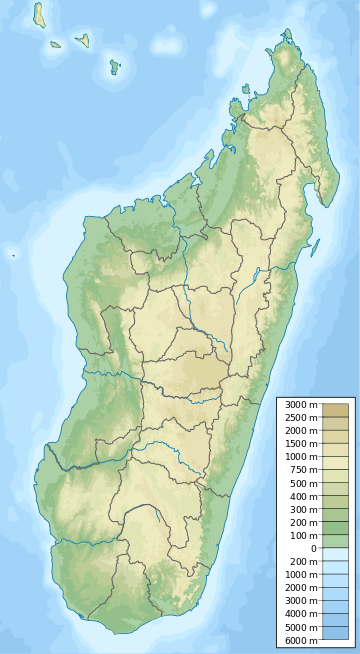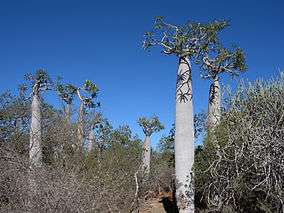Tsimanampetsotsa National Park
| Tsimanampetsotsa National Park | |
|---|---|
|
IUCN category II (national park) | |
|
Pachypodium geayi in Tsimanampetsotsa | |
 Map of Madagascar | |
| Location | South-west Madagascar |
| Nearest city | Toliara |
| Coordinates | 24°05′56″S 43°49′55″E / 24.099°S 43.832°E[1]Coordinates: 24°05′56″S 43°49′55″E / 24.099°S 43.832°E[2] |
| Area | 456 km2 (176 sq mi) |
| Established | 1927 |
Tsimanampetsotsa National Park also spelt Tsimanampetsotse, and known as Tsimanampetsotsa Nature Reserve is a national Park in the region Atsimo-Andrefana in Madagascar. It lies on the south-west coast and contains Lake Tsimanampetsotsa, an important wetland which is registered as a Ramsar site.
History
Tsimanampetsotsa was first protected in 1927 for its endemic flora and fauna and became a national park in 1966.[3]
Geography
The park is 90 kilometres (56 mi) south of Toliara and 950 kilometres (590 mi) south of of the capital, Antananarivo. Route Nationales (RN) 10 to Faux Cap passes the park and the nearest airport is at Toliara. The climate is hot and dry with drought for nine to eleven months of the year, and the annual rainfall is less than 300 millimetres (12 in), which makes the area the driest in the country. The minimum winter temperature averages 15 °C (59 °F) to 20 °C (68 °F) with maximum temperatures exceeding 40 °C (104 °F) in the rest of the year.[4][5]
The eastern section of the park has calcareous soil with dry thorny forest and to the west is the shallow, saline, Lake Tsimanampetsotsa. There are several walks of differing duration and interests:
- Tsiamaso circuit, which includes the Mitoho Grotto (cave) with its blind fish, (Typhleotris madagascariensis)
- Andaka circuit, which follows the lake's shore to watch birds
- Emande circuit, to visit tombs and some wonderful landscapes
- Andalamaike circuit, for a botanical walk through arid landscapes and spiney forest.[3]
Tsimanampetsotsa Lake
The lake is part of a Ramsar site with a total area of 456,000 hectares (1,130,000 acres), although the surface of the lake is much smaller. The park takes its name from the brackish, soda-saturated lake. Due to the high salinity, there are no fish, but more than one hundred bird species are found within the park, including waders, ducks and flamingos. The lake sustains populations of greater flamingo (Phoenicopterus roseus) and lesser (dwarf) flamingo (Phoenicopterus minor).[3]
Viewpoint
The viewpoint is accessed from the car park, about half way along the east side of the lake. It is a short, but steep walk of about 200 metres (660 ft), where some scrambling over rocks may be required. It provides splendid views across the lake.[3]
Mitoho Grotto
Mitoho Grotto lies at the end of the nature trail from one of the two campsites. This is a sacred site where according to the local beliefs of the Antambahoka, an invisible people, live. Within the limestone cave system lives the blind fish (Typhleotris madagascariensis). There is also a colony of swallows (Phedina borbonica).:[3]
Flora and fauna
Eighty-eight species of birds are known from the park, of which thirty-five are endemic to Madagascar, including the Madagascan plover (Charadrius thoracicus) which is listed by the International Union for Conservation of Nature (IUCN) as a vulnerable species by Birdlife International.[6]
| Viewing time | Species |
|---|---|
| Daytime |
|
| Nighttime |
|
References
- ↑ "Tsimanampetsotsa National Park". protectedplanet.net.
- ↑ "Tsimanampetsotsa National Park". protectedplanet.net.
- 1 2 3 4 5 "Tsimanampetsotsa National Park". Madagascar Travel Guide. Retrieved 6 November 2016.
- ↑ Preston-Mafham, Ken (1991). Madagascar: A Natural History. Oxford: Facts On File. ISBN 0 8160 2403 0.
- ↑ Masika sipa. "National Park Tsimanampetsotsa". Mada Magazine. Retrieved 6 November 2016.
- ↑ "Charadrius thoracicus". The IUCN Red List of Threatened Species. Retrieved 6 November 2016.
- ↑ Mittermeier, R.A.; Louis, E.E.; Richardson, M.; Schwitzer, C.; et al. (2010). Lemurs of Madagascar. Illustrated by S.D. Nash (3rd ed.). Conservation International. p. 665. ISBN 978-1-934151-23-5. OCLC 670545286.
| Wikimedia Commons has media related to Tsimanampetsotse National Park. |

